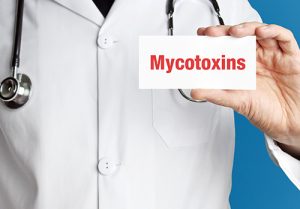
Image By MQ-Illustrations
Mycotoxins could be lurking in your home (or workplace) and might just be the culprit behind your chronic illness! But what are these stealth invaders? Why haven’t we heard about them before? And is it possible to reverse their effects? Let’s discuss!
Is Mold Dangerous?
Mycotoxins come from various forms of fungi. The mold releases toxic gas compounds— mycotoxins— into the air and can be dangerous to human health. One famous mycotoxin-producing mold is black mold. These molds can grow inside walls, HVAC units, building foundations, and the like. And scarily enough, some mycotoxigenic fungi can even invade crops such as grains.
Exposure: Mimicking Illness
Mycotoxin poisoning can be challenging to diagnose as many people may not even realize they’ve been exposed. Exposure symptoms may vary based on the type of mycotoxin involved and the person’s own genetic and metabolic makeup. Mycotoxin poisoning can mimic seasonal allergies, colds, and even severe autoimmune disorders. Many doctors, even wholistic doctors, may be unfamiliar with mycotoxins and may not know when or how to test for it in their ailing patients. As interest in this topic continues to expand research, hopefully, awareness amongst medical practitioners and the general population will continue to rise. When determining whether your symptoms are related to mold or not, a mycotoxin urine test may reveal if there are mycotoxins in your system.
Genetics is another area in need of further investigation. As many as 25% of Americans may have a genetic predisposition to mycotoxin poisoning related to the HLA_DR gene. Individuals with certain expressions of this gene are more susceptible to the effects of toxic molds. Their bodies are unable to make the antibodies necessary to recognize and remove these toxins from the body. Instead, these toxins are stored in the body’s tissues where they can cause problems long-term. Genetic testing is available to determine if someone is dealing with this particular predisposition.
Autoimmunity Concerns
One of the more concerning topics surrounding mycotoxins is the role they play in autoimmunity. Mycotoxins cause damage to the mitochondria of our cells. As we know from middle school science class, the mitochondria are the “powerhouse of the cell.” They are cellular energy factories, taking nutrients and converting them into usable energy. Energy is essential for all of the body’s functions. Mycotoxins are known to trigger the creation of antimitochondrial antibodies— antibodies with no other purpose than to attack and destroy healthy mitochondria. Researchers have not yet determined all the potential manifestations of mycotoxin poisoning, but it is clear that it may play a significant role in various autoimmune conditions.
Mycotoxins: Addressing Exposure
So, what if someone has suffered significant mycotoxin exposure or has a gene leaving them vulnerable? The first step is to determine the source of exposure. If you are living or working in a moldy environment, it may be time to take drastic measures, such as a renovation or relocating. Testing kits are available to test the environment such as your home for mycotoxins. In some cases, mold remediation may be possible, although often it is a costly process. Once someone is removed from exposure, the next step will be to support them in their natural detoxification processes. This includes optimizing liver health and working to stimulate the lymphatic system. The goal is to help clear the body of mycotoxins. Some doctors recommend ingesting binders such as charcoal to help coax the toxins out of the body. If you suspect mycotoxins have affected your health, it’s important to talk to a doctor experienced in this area to receive proper testing and treatment.
Got Medicare Questions?
We hope that this information on mycotoxins is useful to you.
Let us help you answer your questions so that you can get back to the activities that you enjoy the most.
Call (888) 446-9157, click here to get an INSTANT QUOTE, or leave a comment below!
See our other websites:

